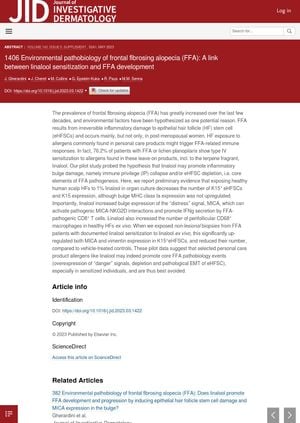Environmental Pathobiology of Frontal Fibrosing Alopecia: A Link Between Linalool Sensitization and FFA Development
April 2023
in “
Journal of Investigative Dermatology
”

TLDR Being allergic to linalool, a common fragrance ingredient, might contribute to developing frontal fibrosing alopecia.
Frontal fibrosing alopecia (FFA), a condition resulting from irreversible inflammatory damage to hair follicle stem cells, has seen a significant increase in prevalence, with environmental factors potentially playing a role. A pilot study found that exposure to linalool, a terpene fragrant found in personal care products, may promote inflammatory damage, a core element of FFA pathogenesis. The study found that 76.2% of FFA patients showed sensitization to allergens like linalool. Exposure to 1% linalool decreased the number of K15+ epithelial hair follicle stem cells and increased the expression of the "distress" signal, MICA, which can activate pathogenic interactions and promote secretion by FFA-pathogenic CD8+ T cells. Linalool also increased the number of perifollicular CD68+ macrophages. When non-lesional biopsies from FFA patients with documented linalool sensitization were exposed to linalool, it significantly up-regulated both MICA and vimentin expression and reduced their number, compared to controls. This suggests that allergens like linalool may promote FFA pathobiology events and are best avoided.



